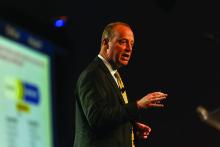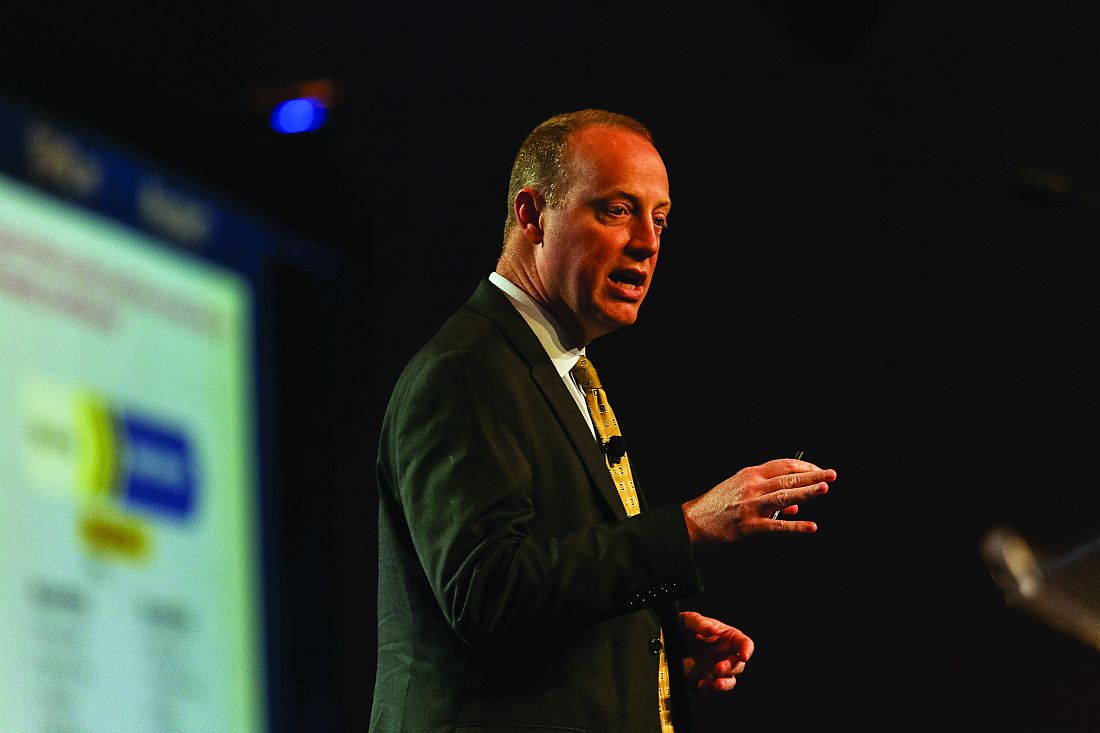User login
LAS VEGAS – The path to improved health care in the U.S. may never be straight – and it certainly won’t be easy – but the three plenary speakers at HM17 think its destination is pretty clear: a system that increasingly rewards quality care delivered at lower costs.
And the three experts agreed that there may be “no finer group” than hospitalists to continue leading the charge.
Hospitalists “have been at the center of change, not only in building a new field and showing us that medicine doesn’t have to be the way it always was,” said Karen DeSalvo, MD, MPH, MSc, former acting assistant secretary for health in the U.S. Department of Health and Human Services. “You have been at the forefront of seeing that we’re getting better value out of our health care system.”
Dr. DeSalvo believes HM’s scope of practice must evolve to include a focus on social determinants – such as economic stability, neighborhood and physical environment, education, and access to healthy options for food – because they have “direct relationships with mortality and morbidity and cost.”
In other words, Dr. DeSalvo wondered aloud, what good is treating a grandmother’s heart failure over and over if she’s always going to return to the hospital because her home, her neighborhood, or her finances mean she is unable to prevent recurring issues?
“If you listen to the hoof-beats that are coming, there is definitely a financial imprimatur to do this,” Dr. DeSalvo said. “There is going to be an expectation from public and private payers... that we are going to be taking into account and addressing social factors. Just look at the data from the people of this country – they are shouting loudly to you that they need help.”
“I can tell you our system still does not have a highly reliable, whole health system for those children and their families,” he said. “Every weekend, I have a family that I can’t discharge because they don’t have the social and home-based supports for them to go home. So they literally sit in the hospital until Monday. That makes no sense for our overall health system.”
Dr. Conway assured attendees that health system transformation is a bipartisan ideal and that for all the tumult in Washington, the progress of testing new payment- and service-delivery models will move forward.
The work “on value, the work on accountability, the work on bundled payments... will continue and will continue to be important to you and the patients you serve,” he said.
Robert Wachter, MD, MHM, concluded the meeting – as is tradition – by telling hospitalists the field remains positioned to take the lead for hospital transformation. And technology, despite its myriad frustrations, is still the tool that will get the field there.
“Digital is really important here, because it becomes an enabler for those stakeholders who care about what we do to measure what we do, and our ability to change what we do in a far more robust way than we could ever do before, if we get our acts together,” Dr. Wachter said. “We’re well past the time where you can nibble around the edges here, you can get this done with little mini projects. You really have to remake your whole delivery system, the way you do your work in order to succeed in this environment.”
Dr. Wachter agreed that social determinants must be addressed. He said HM might do better to partner with folks handling those issues, rather than tackling them head on. Instead, HM needs to be “focusing on the right things” amid mounting pressures from digitization, consolidation of everything from health systems to insurance companies to HM companies, and the gravitation toward population health.
“We have successfully positioned ourselves as the people who are leaders in this work,” Dr. Wachter said, “and it is increasingly important that we continue to do that as we go forward.”
LAS VEGAS – The path to improved health care in the U.S. may never be straight – and it certainly won’t be easy – but the three plenary speakers at HM17 think its destination is pretty clear: a system that increasingly rewards quality care delivered at lower costs.
And the three experts agreed that there may be “no finer group” than hospitalists to continue leading the charge.
Hospitalists “have been at the center of change, not only in building a new field and showing us that medicine doesn’t have to be the way it always was,” said Karen DeSalvo, MD, MPH, MSc, former acting assistant secretary for health in the U.S. Department of Health and Human Services. “You have been at the forefront of seeing that we’re getting better value out of our health care system.”
Dr. DeSalvo believes HM’s scope of practice must evolve to include a focus on social determinants – such as economic stability, neighborhood and physical environment, education, and access to healthy options for food – because they have “direct relationships with mortality and morbidity and cost.”
In other words, Dr. DeSalvo wondered aloud, what good is treating a grandmother’s heart failure over and over if she’s always going to return to the hospital because her home, her neighborhood, or her finances mean she is unable to prevent recurring issues?
“If you listen to the hoof-beats that are coming, there is definitely a financial imprimatur to do this,” Dr. DeSalvo said. “There is going to be an expectation from public and private payers... that we are going to be taking into account and addressing social factors. Just look at the data from the people of this country – they are shouting loudly to you that they need help.”
“I can tell you our system still does not have a highly reliable, whole health system for those children and their families,” he said. “Every weekend, I have a family that I can’t discharge because they don’t have the social and home-based supports for them to go home. So they literally sit in the hospital until Monday. That makes no sense for our overall health system.”
Dr. Conway assured attendees that health system transformation is a bipartisan ideal and that for all the tumult in Washington, the progress of testing new payment- and service-delivery models will move forward.
The work “on value, the work on accountability, the work on bundled payments... will continue and will continue to be important to you and the patients you serve,” he said.
Robert Wachter, MD, MHM, concluded the meeting – as is tradition – by telling hospitalists the field remains positioned to take the lead for hospital transformation. And technology, despite its myriad frustrations, is still the tool that will get the field there.
“Digital is really important here, because it becomes an enabler for those stakeholders who care about what we do to measure what we do, and our ability to change what we do in a far more robust way than we could ever do before, if we get our acts together,” Dr. Wachter said. “We’re well past the time where you can nibble around the edges here, you can get this done with little mini projects. You really have to remake your whole delivery system, the way you do your work in order to succeed in this environment.”
Dr. Wachter agreed that social determinants must be addressed. He said HM might do better to partner with folks handling those issues, rather than tackling them head on. Instead, HM needs to be “focusing on the right things” amid mounting pressures from digitization, consolidation of everything from health systems to insurance companies to HM companies, and the gravitation toward population health.
“We have successfully positioned ourselves as the people who are leaders in this work,” Dr. Wachter said, “and it is increasingly important that we continue to do that as we go forward.”
LAS VEGAS – The path to improved health care in the U.S. may never be straight – and it certainly won’t be easy – but the three plenary speakers at HM17 think its destination is pretty clear: a system that increasingly rewards quality care delivered at lower costs.
And the three experts agreed that there may be “no finer group” than hospitalists to continue leading the charge.
Hospitalists “have been at the center of change, not only in building a new field and showing us that medicine doesn’t have to be the way it always was,” said Karen DeSalvo, MD, MPH, MSc, former acting assistant secretary for health in the U.S. Department of Health and Human Services. “You have been at the forefront of seeing that we’re getting better value out of our health care system.”
Dr. DeSalvo believes HM’s scope of practice must evolve to include a focus on social determinants – such as economic stability, neighborhood and physical environment, education, and access to healthy options for food – because they have “direct relationships with mortality and morbidity and cost.”
In other words, Dr. DeSalvo wondered aloud, what good is treating a grandmother’s heart failure over and over if she’s always going to return to the hospital because her home, her neighborhood, or her finances mean she is unable to prevent recurring issues?
“If you listen to the hoof-beats that are coming, there is definitely a financial imprimatur to do this,” Dr. DeSalvo said. “There is going to be an expectation from public and private payers... that we are going to be taking into account and addressing social factors. Just look at the data from the people of this country – they are shouting loudly to you that they need help.”
“I can tell you our system still does not have a highly reliable, whole health system for those children and their families,” he said. “Every weekend, I have a family that I can’t discharge because they don’t have the social and home-based supports for them to go home. So they literally sit in the hospital until Monday. That makes no sense for our overall health system.”
Dr. Conway assured attendees that health system transformation is a bipartisan ideal and that for all the tumult in Washington, the progress of testing new payment- and service-delivery models will move forward.
The work “on value, the work on accountability, the work on bundled payments... will continue and will continue to be important to you and the patients you serve,” he said.
Robert Wachter, MD, MHM, concluded the meeting – as is tradition – by telling hospitalists the field remains positioned to take the lead for hospital transformation. And technology, despite its myriad frustrations, is still the tool that will get the field there.
“Digital is really important here, because it becomes an enabler for those stakeholders who care about what we do to measure what we do, and our ability to change what we do in a far more robust way than we could ever do before, if we get our acts together,” Dr. Wachter said. “We’re well past the time where you can nibble around the edges here, you can get this done with little mini projects. You really have to remake your whole delivery system, the way you do your work in order to succeed in this environment.”
Dr. Wachter agreed that social determinants must be addressed. He said HM might do better to partner with folks handling those issues, rather than tackling them head on. Instead, HM needs to be “focusing on the right things” amid mounting pressures from digitization, consolidation of everything from health systems to insurance companies to HM companies, and the gravitation toward population health.
“We have successfully positioned ourselves as the people who are leaders in this work,” Dr. Wachter said, “and it is increasingly important that we continue to do that as we go forward.”

